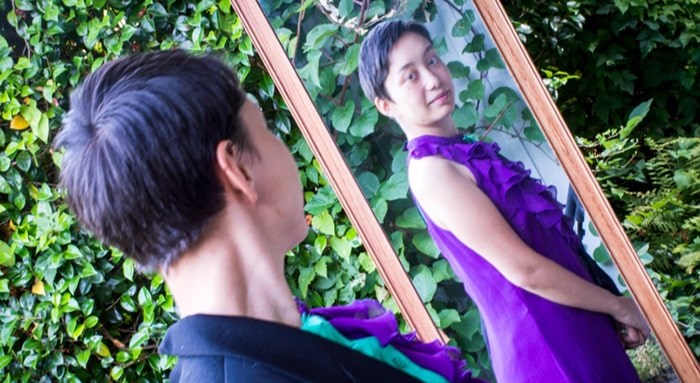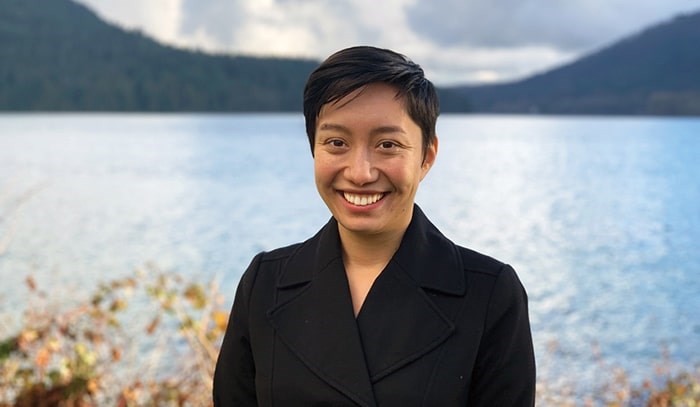Amita Kuttner, the Green Party candidate in Burnaby North-Seymour, celebrated Pride this week by coming out as pansexual and gender non-binary.
 Amita Kuttner, running for the Green Party in Burnaby North-Seymour, came out as non-binary and pansexual for Pride. Photograph By Contributed to Burnaby Now
Amita Kuttner, running for the Green Party in Burnaby North-Seymour, came out as non-binary and pansexual for Pride. Photograph By Contributed to Burnaby Now
In a blog post titled “Identity in Politics,” the 28-year-old astrophysicist wrote, “I want to share that I am non-binary, genderfluid and feel agender a lot of the time. I am pansexual.”
'I was freaking out'
Kuttner told the NOW it was a difficult decision to come out in such a public way.
“I was freaking out for the whole week. My heart was beating super fast. It was just super intense,” Kuttner said.
“I wish that we were at a point in the world now where coming out wasn't a thing anymore, where everybody could just be themselves and it didn't matter, gender didn't matter, sexual orientation [didn’t] matter and you're just a person and that's the end of it.”
But society has yet to progress to that point, and there is value in a politician making their identity public, Kuttner said. (Kuttner prefers they/them/their pronouns.)
And, Kuttner said, coming out will allow them to be their authentic self in public life.
“I decided to come out because of feeling a kind of incongruity trying to just act like I'm just a woman all the time,” they said.
'There's a lot of words'
Kuttner said “non-binary” – meaning they do not identify as either male or female – is the term they feel applies to them at all times.
Specifically, Kuttner said they are primarily agender – “For me, it means most of the time, I don’t feel anything, I don’t have a very strong relationship to gender at all.”
But Kuttner also identifies as genderfluid “because sometimes I really do feel something in both directions. ... It’s random, day by day.”
Kuttner said being pansexual “means that gender doesn’t matter when I’m attracted to someone.” Asked how pansexuality differs from bisexuality, Kuttner laughed, saying they weren’t entirely certain.
“There’s a lot of words and I am not entirely sure what they all mean anymore. Pan(sexual) seems right because it’s gender irrelevant in the way that I understand it,” Kuttner said.
They said they know they’re not alone in being confused by new terminology for gender and sexuality. People should feel comfortable asking questions without fear of offending anyone, Kuttner said.
Kuttner also used their coming out to push for policy changes related to gender and sexual identity: banning gay conversion therapy, allowing a third gender option on government IDs and changing default pronouns to they/them on government documents.
These changes would all be steps towards making Canada a more inclusive and equitable place, they said.
'It shouldn't be a big deal'
But merely having an openly non-binary candidate in a federal campaign is a good thing, according to Jen Marchbank, a professor in Simon Fraser University’s gender, sexuality and women’s studies department.
“I think it's great ... that they feel comfortable enough to be able to do this in such a public way, but it shouldn't be a big deal,” she said.
Ideally, Marchbank said, it would be just as normal to have a non-binary, pansexual candidate as a heterosexual, cigender (someone who identifies with the gender assigned to them at birth) candidate.
“Nobody bats an eye when a candidate says ‘Here is my darling wife and my adoring children.’ But why is being non-binary a story? Because it's unusual.”
By coming out, Kuttner could be helping to show other non-binary people they too can enter politics, Marchbank said.
Should the Green candidate win in Burnaby North-Seymour this October, it would be a “bonus” to have someone with Kuttner’s experiences in the halls of power, she said.
“Our parliamentary representatives should be as diverse as our population,” Marchbank said.
 Amita Kuttner, running for the Green Party in Burnaby North-Seymour, came out as non-binary and pansexual for Pride. Photograph By Contributed to Burnaby Now
Amita Kuttner, running for the Green Party in Burnaby North-Seymour, came out as non-binary and pansexual for Pride. Photograph By Contributed to Burnaby Now
Coming out 'exciting'
It’s not clear whether Kuttner is the first non-binary candidate representing a major party in federal Canadian politics. The NOW reached out to five parties, asking whether they had any non-binary candidates, past or present. A Liberal spokesperson said they have several LGBTQ candidates, including a transgender man, but did not directly answer the question. A People’s Party spokesperson said he wasn’t aware of any non-binary candidates. The Greens, Conservatives and NDP did not respond by deadline.
Kuttner is not the first candidate in their riding to come out publicly. In 1988, the NDP’s Svend Robinson became the first openly gay MP. Now attempting a comeback to federal politics, Robinson said it was “exciting” to see his opponent’s announcement.
Robinson admitted he had to Google a couple of the terms Kuttner used but said he thinks it’s great people are finding new labels to describe themselves.
'So many important things to be done'
For Kuttner, though, there is no plan to put these recently disclosed identities at the centre of their campaign.
“One of my fears about doing this was that it would become like a really big thing that people would be harping on,” they said. “While I do find that these issues are important and I experience them myself, there are so many important things to be done.”



